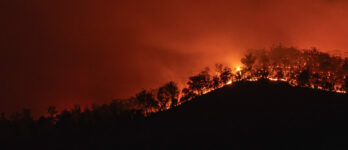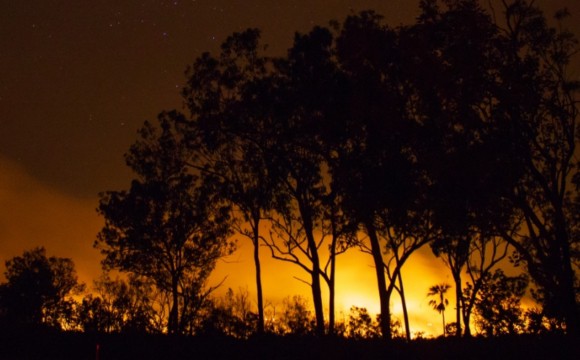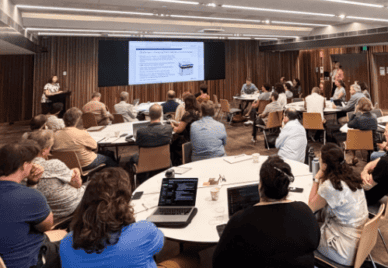
The unprecedented 2019/2020 Australian bushfires showed in full force the devastating impact bushfires can have on the natural landscape, the built environment and human health.
To protect our environment and communities, respond effectively to bushfires, and recover from them in the future, the Royal Commission into National Natural Disaster Arrangements (2020) recommended supporting better decision making through the sharing of data.
In partnership with the bushfire community, the Australian Research Data Commons (ARDC) is investing in developing innovative digital infrastructure solutions to share data to improve Australia’s bushfire resilience, response and recovery.
The ARDC is implementing it’s bushfire data challenges in 2 phases, with the first focusing on understanding fire behaviour and the second focusing on understanding impact. These two phases together will greatly improve fire risk modelling and bushfire management.
The ARDC is pleased to announce 8 new projects in the Bushfire Data Challenges program, representing a total ARDC investment of $2.37 million, a significant Minderoo contribution, and $3.328 million in co-investment from partnering organisations.
This is in addition to 5 phase 1 projects, announced in July 2021, in which the ARDC is investing $2.4 million, with $3.095 million in co-investments from partners.
A National Approach to Bushfire Digital Infrastructure
The ARDC conducted 14 months of targeted consultations for the Bushfire Data Challenges program, including a series of facilitation meetings and participatory design workshops with 151 stakeholders. This process captured priority areas for national digital research infrastructure to address data challenges around Australia’s resilience and response to bushfires, and aid our recovery.
The ARDC convened key national stakeholders from the research and public sectors to design a national data capability that spans research, development and operational planning, response and recovery.
These key areas are supported by the Royal Commission into Natural Disaster Arrangements (2020), which states: “Strategic and operational decision making, including at a national level, requires a consistent and contemporary understanding of disaster risks and impacts and relies on credible, accessible and up to date data and information.”
Creating a Translational Research Bushfire Data Commons
The ARDC is pleased to announce the addition of the following 7 projects to the Bushfire Data Challenges program:
Lead by: Australasian Fire and Emergency Service Authorities Council (AFAC)
This project will deliver key elements towards a bushfire fuel data commons for use by national bushfire simulation and other fire prediction systems. The elements include fuel classification, algorithms used to calculate fuel attributes and frequently updated observed fuel attributes including load, structure, and dryness.
Lead by: Natural Hazards Research Australia (NHRA)
This project will assemble and manage national bushfire research data collections. The NHRA will develop a conceptual framework for bushfire research data management and establish a web-based bushfire research data catalogue.
Lead by: National Air Quality Technical Advisory Group (NATAG)
This project will deliver a federated Australian air quality data system and a bushfire-specific air pollution exposure dataset that’s consistent nationally. It will bring together the vast amount of air quality data collected in Australia into a common architecture and provide air pollution exposure mapping, processing and analysis.
Lead by: Australian Institute of Health and Welfare (AIHW)
This project will develop an accessible data asset of bushfire-related health service use, over an extended time period, and by small geographic area. This will facilitate researchers in studying the immediate and longer-term effects of bushfire on human physical and mental health.
Lead by: Atlas of Living Australia (ALA)
In this project, the ALA will collaborate with experts to create a curated biodiversity dataset that can be used off-the-shelf for bushfire impact modelling. This will also incorporate edits and annotations by expert users back into the main ALA dataset, enriching the data resource for a range of users.
Lead by: Atlas of Living Australia (ALA)
To create tools that allow conservation managers to protect species and their genetic diversity, this project will locate and aggregate descriptions of all relevant genomic data in one place (e.g. genome assemblies, genome annotations, barcodes, raw data, other omic data).
Lead by: Invertebrates Australia
This project will build an enduring living database of fire-relevant ecological and life history traits for Australian invertebrate species. Such information is crucial to help rapidly identify the species likely to be most imperiled by future comparable fires, and to guide targeted management where it is needed.
Lead by: University of Melbourne
This project will provide a secure platform for researchers to access diverse bushfire related datasets together with a suite of analytic and visualisation tools to perform a variety of bushfire related simulations and analyses.
Read more about the projects in the Bushfire Data Challenges program.
The ARDC is funded through the National Collaborative Research Infrastructure Strategy (NCRIS) to support national digital research infrastructure for Australian researchers.
Last updated 28 March 2022
Categories
Research Topic
Related Program
Related Projects
Related News & Events
Related Case Studies






